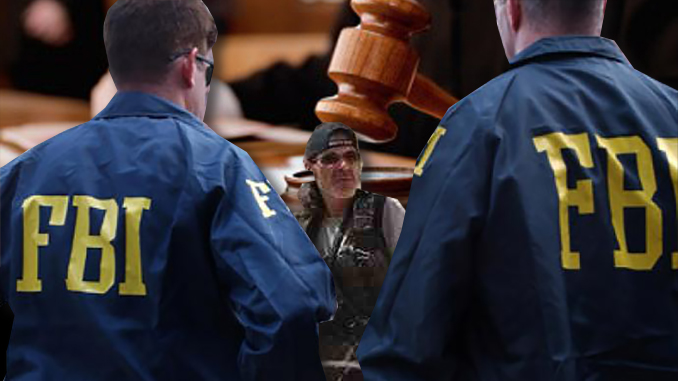
Last week, the jury in the first of three trials of supporters of Nevada rancher Cliven Bundy ended in a hung jury for four of the six defendants. Perhaps most shocking in the case was one of the two found guilty of multiple charges had been a paid FBI informant.
By Mark Anderson
LAS VEGAS, Nevada—In the three-part, landmark case that arose from the 2014 standoff near Bunkerville, Nev. between multiple federal agencies and supporters of rancher Cliven Bundy, the jury deadlocked on April 24, forcing U.S. District Judge Gloria Navarro to declare a mistrial. Federal prosecutors were unable to secure convictions for four of the six defendants in the first of three trials. Shockingly, one of the two men convicted had been an FBI informant for years. His cover was blown during trial testimony.
The four defendants who escaped conviction were Richard Lovelien, Eric Parker, O. Scott Drexler, and Steven Stewart. The 12-member jury fell far short of convicting these four, according to defense lawyers.
The jury found two defendants in the opening trial—Todd Engel and Gregory Burleson—guilty of some charges, with Burleson bearing the brunt. During testimony, FBI agents said Burleson was an informant.
Engel was charged with obstruction of justice and using interstate commerce to commit extortion. Engel could possibly be sentenced to two years in prison, though it’s likely he’ll get considerable credit for time already served.
Bug Out While You Still Can! Learn More…
The jury found Burleson guilty of multiple charges, including using a firearm to assault federal officers, interfering with federal officers, and extortion. The New American reports that Burleson of Phoenix, Ariz. has been a paid informant for the FBI for years, so don’t expect the provocateur to see the inside of a jail cell.
It is standard operating procedure for the FBI to send in informants to escalate violence in an effort to trump up conspiracy charges. Since some of the defendants in the Nevada cases were cleared earlier this year in Portland federal court of any wrongdoing for their part in the Oregon occupation-protest that ended in early 2016, the federal government is determined to secure convictions in a future trial. A staffer in the dockets department of the U.S. to Judge Navarro both confirmed that Lovelien, Parker, Drexler, and Stewart will be retried starting June 26.
That is the same date listed in the docket for the second trial, in which longtime rancher Cliven Bundy and two of his sons, Ryan and Ammon, along with Ryan Payne and Internet radio host Pete Santilli, are the defendants. It’s expected to be an especially high-profile affair in which the bedrock fundamentals of federal land jurisdiction and control ought to be rigorously debated.
The third and final trial, involving Bundy’s sons Mel and Dave, along with Joseph O’Shaughnessy, Brian Cavalier, Jason Woods, and Micah McGuire, is expected to begin sometime in the fall.
The defendants in all three trials are being tried for their part in supporting Bundy in the now-legendary April 2014 standoff between armed federal Bureau of Land Management (BLM) agents and the elder Bundy, four of the Bundy sons, and a host of supporters.
When the BLM showed up to impound hundreds of Bundy’s cattle for alleged unpaid grazing fees on public lands, supporters traveled to southern Nevada, near Bunkerville, to stand with Bundy in protest of federal land policies. The standoff was dubbed “The Battle of Bunkerville,” though not a single shot was fired.
Still, the federal government, which has been laboring to make its case that those who gathered with the elder Bundy pointed their weapons at heavily armed federal officers in a “threatening” manner, seeks to send all the defendants to prison—for life, if possible.
The defense maintains that Bundy’s supporters showed up only to exercise their First and Second Amendment rights in protest of BLM policies.
Assessing the situation, Roger Roots, an author and legal expert who attended nearly every day of the first trial, told AMERICAN FREE PRESS: “Maybe you can’t call this [deadlocked jury] a victory for the Bundy side. But the government’s ‘stock’ went down in this thing. And the feds, including the judge, are under a lot of pressure to try and provide speedy trials.”
Mark Anderson is AFP’s roving editor.


